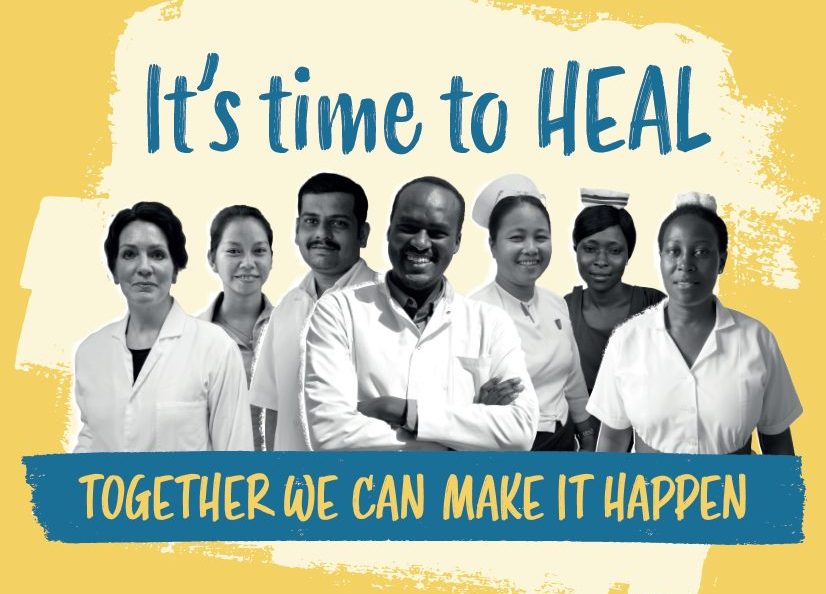
THET's HEAL campaign
Achieving Universal Health Coverage – webinar report back
12 January 2022
To mark UHC Day 2021 [opens new tab], THET joined forces with Action for Global Health and Students for Global Health to call for Health Equity for All in this webinar ‘HEAL: Together for UHC’ [watch the full webinar here – opens new tab]. Lynda Keeru and Kate Hawkins from Pamoja Communications [opens new tab] reflect on what was said.
Ben Simms kicked off the webinar by reflecting on 2021, the second year of the pandemic. He said that COVID-19 exposed many existing inequalities, such as the harrowing ongoing vaccine inequality. There is a silver lining to this as it brings to light some of the inequalities people were not aware of, which he said was a useful thing, because by naming it, the journey to address it can begin. The pandemic has torn apart the world in so many ways, threatening decades of development progress. He challenged the webinar participants to think about how to find optimism that is so necessary in order to move forward. The greatest ray of hope is health workers and their commitment, as seen in how much they have stretched and worked so hard, not just in their day jobs but reaching across borders to express solidarity with each other.
The pandemic has forced people to have a much broader notion of who a health worker is, as people came to the realization that a huge coalition of people is needed to advance Universal Health Coverage (UHC). The HEAL Campaign [opens new tab] brings together health workers prepared to speak out and make their views heard.
Power in partnership: Sonia Akrimi noted that the lessons learned are opportunities for progress, and that it is important to make sure that these lessons lead the actions taken and help develop strategies going forward. There’s need for a united response for this; all governments, policy makers and all healthcare systems and workers must be working together internationally to move the global situation forward. There is a lot of power in partnerships and how they can adapt and enforce meaningful change.
Overcoming inequality: The inequalities revealed and brought about by the pandemic have seriously hampered progress made towards achieving UHC, as highlighted by Jose Manuel Barroso. About 8 billion doses of vaccines have been administered so far worldwide – enough to protect everyone in the planet – yet that’s not what has transpired. The vast majority of those vaccines have been administered in the world’s wealthiest nations. So, while 70% of the population has been vaccinated, only 6-7% of the population in low-and middle-income countries have received their first shot. This inequality is not only morally wrong, but it is also preventing effective management of the pandemic. Ensuring that people all over the world have equitable access to vaccines and that countries have the capacity to distribute them, is the fastest way to end the crisis and set our economies on the road to recovery.
A focus on gender: Roopa Dhatt argued that gender equality must be hard wired into UHC. UHC will only be universal when it reaches everyone. Women face multiple barriers to accessing health services and for this reason, health services under UHC should be allocated according to health needs to address the distinct needs of women, adolescents and girls. UHC must be gender responsive and address gendered determinants of health and the root drivers of gender inequities. This includes ensuring gender equality in the health workforce.
Dealing with fragility: Sally Theobald reiterated that UHC would not be achieved unless there’s a focus on fragility. Fragile contexts are critical and are growing and we must concentrate our efforts there if we are serious about gender, equity and justice.
As we begin 2022, the priority has to be on redoubling efforts to make up for lost ground and building back better. This will bring the world closer to achieving the Sustainable Development Goals.
Watch the webinar here. [opens new tab]